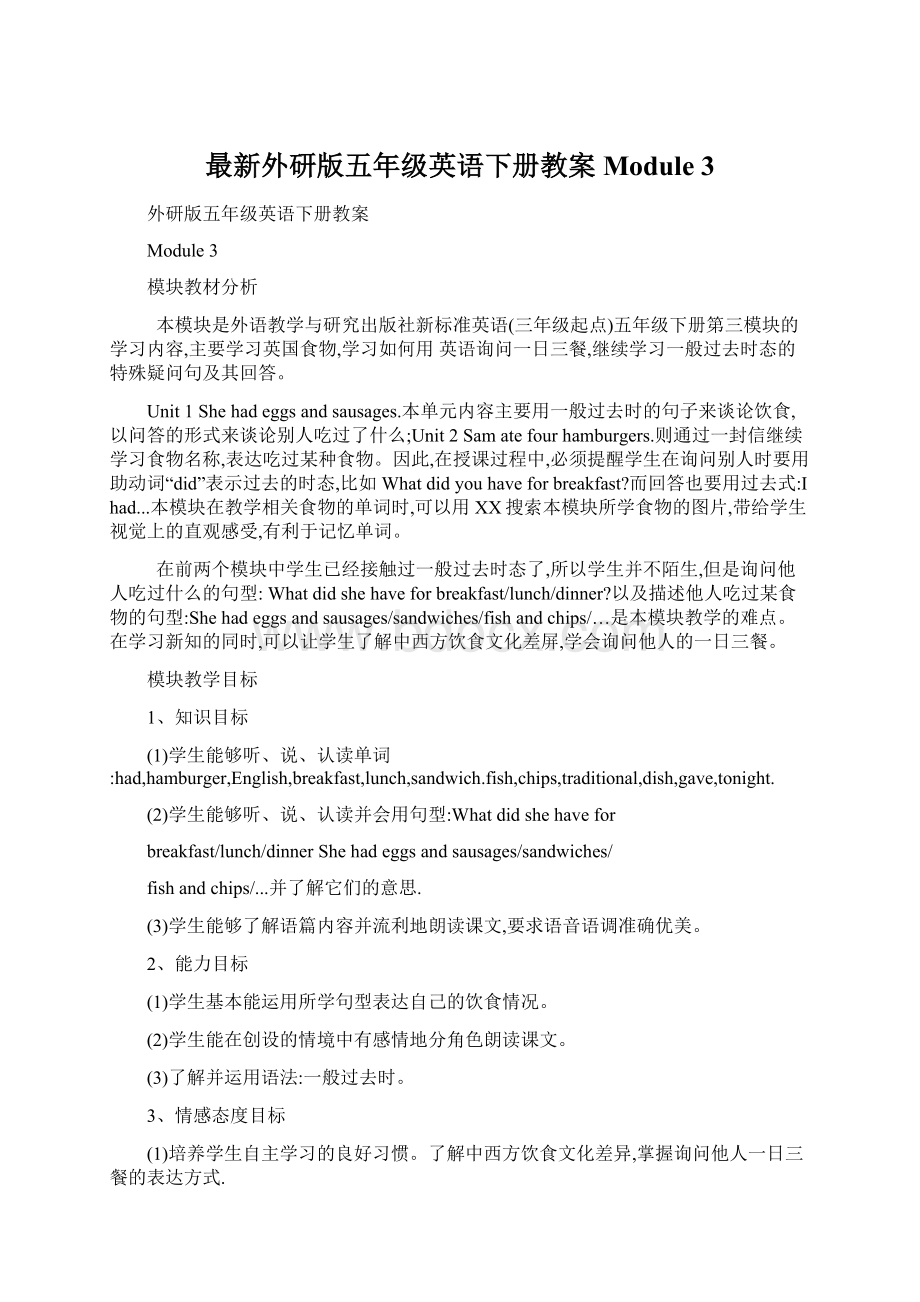最新外研版五年级英语下册教案Module 3文档格式.docx
《最新外研版五年级英语下册教案Module 3文档格式.docx》由会员分享,可在线阅读,更多相关《最新外研版五年级英语下册教案Module 3文档格式.docx(17页珍藏版)》请在冰豆网上搜索。

4、文化意识目标
鼓励学生了解中西方饮食文化的差异,体验中西方文化在国家发展史上的异同之处,养成其良好的饮食习惯。
5、学习策略目标
(1)让学生通过听录音感知对话内容,学会捕捉文中重要信息。
(2)通过观察,让学生发现如何描述生活中的变化。
(3)通过角色表演、小记者报道等语言实践活动,增强学生对所学英语的体验,形成正确的交际策略,提高用英语做事情的能力。
模块教学设想
课时安排建议:
(共分4课时)
第1课时:
Unit11-2
第2课时:
Unit13-4
第3课时:
Unit21-3
第4课时:
Unit24-7
教学流程总体设计:
(总述各课时的教学流程)
Step1Warmingup
Step2Leadingin
Step3Presentation
Step4Practice
Step5Production
Step6Summary
Step7Homework
教学方法:
(总述各课时的教学方法)
谈话法、情境教学法、合作学习法、模仿示范法、练习法、任改学法、全身动作反应法、交际法、游戏教学法等方法。
第1课时
教学内容
教学目标
1.学生能够听、说、认读单词:
had,hamburger,English,breakfast,lunch,sandwich,fish,chips,traditional,dish
2.学生能够听、说、认读并会用句型:
Shehadeggsandsausages/sandwiches
fishandchips/…
3.学生能够了解语篇内容并流利地朗读课文,语音、语调准确优美。
重点难点
重点:
新单词和新句型的教学与运用.
难点:
如何让学生在课堂上学会运用句型:
Shehadeggsandsausages/sandwiches/fishandchips/….并能在生活中灵活运用这些句型。
教学准备
课文动画,cd-rom朗读盘,单词卡,PPT课件,学生练习纸等。
教学设计
1.Greetings.
2.Freetalk.
T:
Hello,boysandgirls.
S:
Hello,Mr./Miss...
what'
syourfavouritefood?
Myfavouritefoodis.(rice/noodles/dumplings...)
DoyouknowsomethingaboutEnglishfood?
Leadin:
Englishfood.
Step2LeadingIn
Dearboysandgirls,sincewehavealreadyplayedthegameoffood,couldyoutellmeanythingelseaboutfoodorwhat'
syourfavoritefood?
Now,youhavetwominutestotalkaboutitwithyourpartners.
Ss:
Noodles,eggs,rice,fish,chicken,meat,bread,sausages
sandwiches,hamburgers…
Ihadnoodlesforbreakfastthismorning,andit'
sdelicious.
Whatdidyouhaveforbreakfast?
Ihadmilk/bread/eggs...
Well,thisisyourbreakfast,butdoyouknowwhatLinglinghadforbreakfast?
DaminggotanemailfromLingling.it'
saboutEnglishfood.let'
sgotoourtextbooktoseewhatshehad
Forbreakfast/lunch/dinner?
Theteachershowsthepicturesoffoodwhichappearinthis
unit.
TellthestudentsDaminggotanemailfromLingling.Ittalks
aboutEnglishfood.Nowlet'
sseewhatLinglingintroduces
Teachthenewconversation:
1.Showstudentssomenewwordcardsandteachthemthe
pronunciations.
2.Openstudents'
books.Listentothetapeforthefirsttime
thenaskthestudentstofindoutthenewwordsandthenamesofthefood.AndintroducesomeEnglisheatinghabits.
1.Listenandrepeat.PayattentiontothepronunciationandIntonation
2.Practiceinpairs,thenreadinroles.
3.Askthestudentstobeinterviewersandreportwhatotherstudentsintheirgroupshadfortheirmeals.
Askthestudentstotalkaboutwhattheyhadfortheirmeals.
1.Theteacherdemonstratesanexamplefirst.
Ihadnoodlesforbreakfastthismorning,andit'
hadsandwichesforlunch.AndIhadfishandchipsfordinner
2.Studentsfinishtheirtasks
3.Asksomestudentstoshowtheirconversationswhilethe
otherslistencarefully,andretellwhattheyhaveheard.
Whathaveyoulearnedtoday?
(进行德育渗透)Healthydiet,healthybody!
1.Readthedialoguefluently.(学困生完成)
2.Makeasurveyonyourgrandparents/parents.Talkaboutthethreemeals.(中等生和学优生完成)
回顾总结
教师带领学生演唱歌谣,配上音乐或拍手打节拍:
Noodlesandrice,
areveryverynice.
Mmm,Mmm,Mmm,veryverynice.
Sandwiches,sandwiches,
arenotverynice.
No,No,No,notverynice.
Fishandchips,
areveryverynicetoo.
Mmm,Mmm,Mmm,veryverynicetoo.
第2课时
Unit13-4
1.学生基本能运用所学句型表达自己的三餐饮食情况。
2.学生能在创设的情境中有感情地分角色朗读课文,并能够熟练问答课本P16-4的内容。
3.了解并运用语法:
一般过去时.
新单词和新句型的巩固、复习与延伸。
熟练掌握一般过去时的用法及肯定句、否定句和疑问句的使用。
教学准备
2.TalkaboutthedialogueinActivity2.
Askthestudentstotalkaboutit.Thenactitout.
Step2Revision
WhatdidLinglinghaveforbreakfast?
WhatdidLinglinghaveforlunch?
WhatdidLinglinghavefordinner?
Letthestudentswatchthevideocarefully(观看带字幕的动画)andtrytoactoutthedialogue.
Listenandsay.
1.Askthestudentstowritethesentences.
E.g.Whatdidshehaveforbreakfast?
Shehadeggsandsausages
2.T:
Nowtalkaboutyourselfwithyourpartner.
Askthestudentstotrytalkingabouttheirdiets.
3.Askthestudentstorememberthefoursentences.
1.Listenandrepeat.PayattentiontothepronunciationandIntonation.
2.Practiseinpairs,thenactinroles.
3.Askeverystudenttobeaninterviewerandreporthisherowndiet.
Askthestudentstotalkaboutthediet.
A:
Whatdidyouhaveforbreakfastyesterday?
B:
Ihadsomerice.
2.Studentsfinishtheirtasks.
第3课时
Unit21-3
1.学生能够听、说、认读词汇:
verymuch,gave,tonight.
Samatefourhamburgersatschool!
Linglinghadasandwichbecause…
3.学生能够了解语篇内容并流利地朗读信件,语音、语调准确优美。
新词汇和新句型的教学与运用
如何让学生在课堂上学会一般过去时态的句型并能
在生活中灵活运用该句型进行问答。
课文动画,CD-ROM朗读盘,单词卡,PPT课件,学生练习纸,贴纸等。
数学设计
热身复习:
Chant:
Nooodlesandriceareverynice.(师生边唱边做动作。
)这是一首学生已经学会的关于食物的歌谣。
在课的开始与进入到英语学习的氛围中,又复习了一些表示食物的单词,为本课的学习做铺垫,可谓一举两得。
热身活动以后,教师告诉学生:
AmywroteanemailtoDaming.ShetoldhimsomethingaboutSam,Linglingandherself.Nowlet'
slistentotheletter.Whatdidshewriteinit?
学习新知
任质页习提纲:
(给学生5分钟的时间,小组对论,完成节教)
(1)画出新单词。
(2)画出动词过去式。
(3)了解课文大意
2.根据预习,逐一解决问题。
(1)学习新单词.
主要学习的动词过去式(eat--ate;
drink--drank;
give--gave)
(注意在讲新单词时对音素的分析与学习,鼓励学生试着根据读音规则读出单词。
)
(2)整理学过的常用动词的过去式.
watch--watched(atelevisionprogramme)
talk--talked(aboutherlife)
cook--cooked(onafire)
work--worked(inthefields)
don'
t-didn'
t(haveatelevision)
can'
t-couldn'
t(readorwrite)
eat-ate(fourhamburgers)
give-gave(ourhamburgerstoSam)
1.Listenandrepeat.Payattentiontothepronunciationandtonation.
2.Practiseinpairs,thenreadingroups.
3.Askthestudentstotalkaboutthetext.
Askthestudentstotalkaboutthetext
2.Studentsfinishtheirtasks
3.Asksomestudentstoshowtheirresults,theotherslisten
Carefullytothernandretellwhattheyhaveheard.
Whathaveyoulearnedtoday?
(进行德育渗透)
1.Listenandreadthetextfluently.(学困生完成)
2.Rememberthetext.(中等生和学优生完成)
教师带领学生演唱歌谣,配上音乐或拍手打节拍
Whatdidyouhaveforbreakfast
Ihadfourhamburgers.
Whatdidyouhaveforlunch?
Ihadasandwich.
Whatdidyouhavefordinner?
Ihadfishandchips.
Ihadfishandchips
第4课时
Unit24-7
1.音标教学:
字母组合“ea/ee,ear,ere/eir”的发音规则。
2.一般过去时态的教学。
3.谈论人们的饮食情况.
新单词和新句型的巩固、复习和拓展。
掌握一般过去时的灵活运用.
课文动画,CD-ROM朗读盘,单词卡,PPT课件,学生练习.
1.Greetings
2.教师鼓励学生说出学过的表示食物的单词。
Canyoutellmesomewordsaboutfoodyouknow?
3.复习动词短语:
让学生自由说出动词“eat,drink,give”的
相关短语,并分清楚这三个动词的具体运用。
如:
eathamburgers,drinkmilk,giveoneappletomysister...
4.Revisep17-2
Step2Presentation
1.Listenandsay.
(1)游戏:
听音标竞赛。
这是一个训练学生听音标的游戏,教师准备两套音标卡片,并将全班分成两组,每人发一张卡片,教师快速念音标,持有该音标卡片的学生应迅速站起来,最先站起来的人得两分,后站出来的得一分,没站出来的得零分,得分多的组获胜。
(2)让学生看书,仔细听录音,思考字母组合发了什么音。
教师把音标板书出来,并且教读,如果时间充足,可以拓展更多能让单词练习,如果时间不足,练习就放在下节课的复习课上进行.
2.Listenandsay.Thenchant.
歌谣的教学.
让学生先跟教师熟读各句,然后听磁带合着节拍一起说歌谣,最后让学生组与组竞赛说,看哪组说得最好。
IlikefishandIlikechips
Step3Production
1.Doandsav.(Part6)
Pickacardandtellastory.
Mumbought...yesterday.Theywere...Iate...Igave...to...
让学生课前把自己喜欢吃的东西画在卡片上,课堂上学生交流今天学习的句型,然后把图片展示给大家.鼓励学生相互评价,注重动词正确形式的运用。
然后可以让个别学生或小组进行问答表演,教师及时给予评价与鼓励。
2.Do,writeandsay.
Doasurvey.Thenwriteandtelltheclassaboutit.
Step4Summary
1.教师提问:
2.对学生进行德育渗透。
设计意图:
通过让学生回顾和总结本节课的知识,适时进行德育渗透,让学生养成正确的饮食习惯。
Step5Homework
1.Listentothechantandreadit.
2.Copyandspellthenewwords.
3.回家后问清楚自己家人喜欢吃的食物,回来后用自己学的句型告诉你的同学和老师。
(选做)
设计意图:
作业设计照顾到不同层次的学生,让每个学生都能让自已的能力水平得到不同程度提升。
教师带领学生唱读歌谣,配上音乐或拍手打节拍:
IlikefishandIlikechips.
Iliketoastandjam.
Buttheverybest-it'
sreallyniceis
my
mum'
s
Chinese
rice
I
like
noodles
and
meat.
apples
pears
But
the
very
best-it'
really
niceis
教辅教案
课时目标
Pleaseremember(请记住下列词汇和句型):
1.Words(交际单词)
had,hamburger,English,breakfast,lunch,sandwich,fishandchips,traditional,dish
2.Phrases(交际词组):
havegotanemailfromLingling,Englishfood,eggsand
sausages,fishandchips,atraditionalEnglishdish
3.Sentences(交际句型):
Whatdidshehaveforbreakfast?
--Shehadeggsandsausages.
--Whatdidshehaveforlunch?
--Shehadsandwiches.
it'
satraditionaIEnglishfood.
童点:
1.单词:
had,hamburger,English,breakfast,lunch,sandwich,
fish,chips,traditional,dish.
句型:
Whatdidshehavefor...